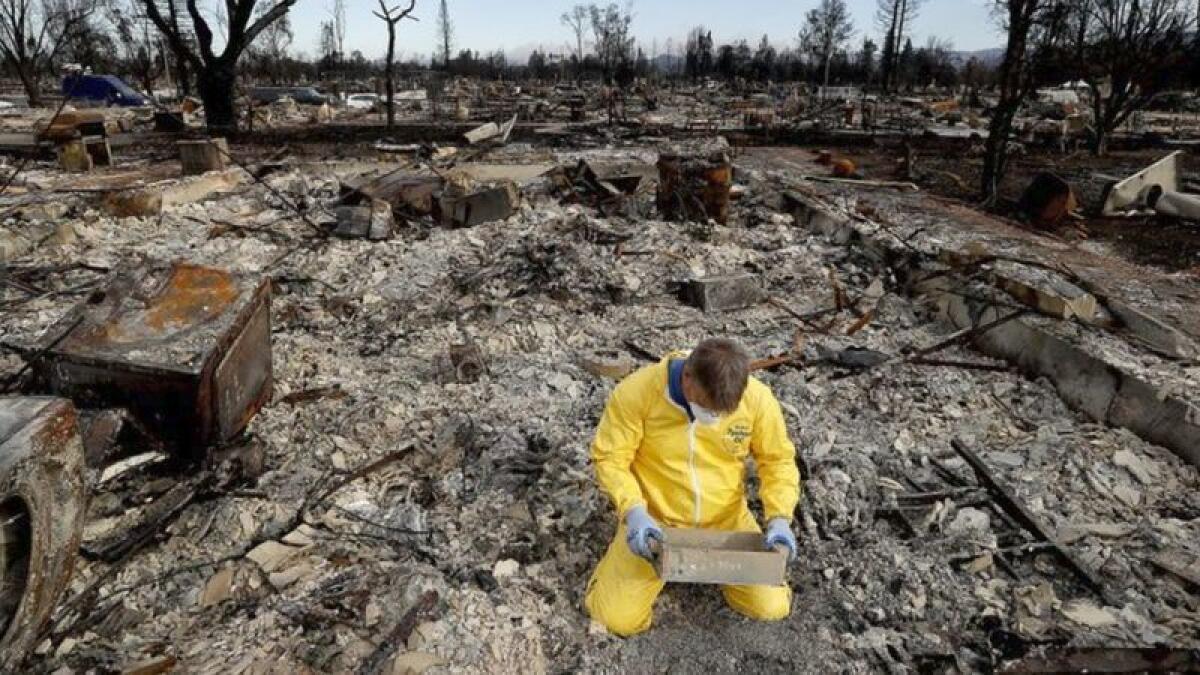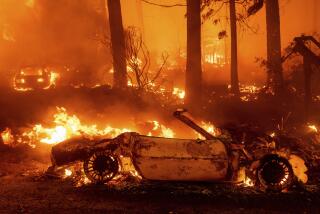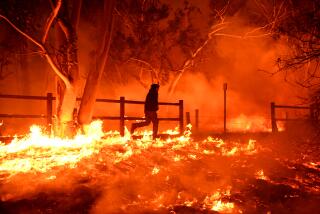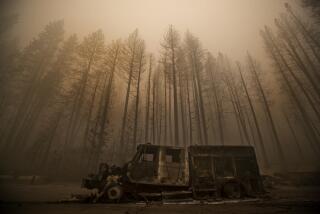Private power lines, not PG&E’s, caused deadly wine country fire, state says

The 2017 fire that destroyed thousands of homes in Santa Rosa, Calif., and killed 22 people was caused by private power lines, not ones owned by utility giant Pacific Gas & Electric Co., a long-awaited state investigation released Thursday concluded.
The finding by Cal Fire marks a bit of good news for the struggling utility as it prepares to file for bankruptcy due to huge potential liabilities related to last year’s Camp fire, which destroyed more than 90% of the town of Paradise and killed at least 86 people.
PG&E’s electrical systems were found responsible for numerous destructive Northern California fires in recent years. In many cases, heavy winds downed power lines that sparked the blazes.
The California Department of Forestry and Fire Protection released few details about the source of the Tubbs fire, saying only that it was caused by “a private electrical system adjacent to a residential structure.” The fire agency also said it found no violations of state law related to the blaze. Whoever owns the lines faces billions of dollars in claims from people who lost their homes.
Despite the investigation’s findings, PG&E said it still is moving forward with Chapter 11 protection. The company was found to be the cause of several other fires that hit wine country in October 2017, including the Atlas fire, which killed six people and destroyed more than 780 structures, and the Redwood Valley fire, which killed nine and razed more than 540 structures.
“PG&E still faces extensive litigation, significant potential liabilities and a deteriorating financial situation, which was further impaired by the recent credit agency downgrades to below investment grade,” the company said in a statement. “Resolving the legal liabilities and financial challenges stemming from the 2017 and 2018 wildfires will be enormously complex and will require us to address multiple stakeholder interests, including thousands of wildfire victims and others who have already made claims and likely thousands of others we expect to make claims.”
At a news conference outside his Capitol office Thursday, Gov. Gavin Newsom said his team believes the Tubbs fire accounted for $17 billion of an estimated $30 billion in liabilities that PG&E said it was potentially facing when it announced plans to file for bankruptcy.
The governor said he’s focusing on what is going to happen to Californians, including how a bankruptcy will affect customers and fire victims seeking compensation for their losses.
“My focus is on safe, reliable and affordable service,” he said. “It’s about making sure that we have the backs of those victims, people who have lost the lives of their family members, people who have lost all that they hold dear and close, as it relates to personal possessions, and that they are made whole.”
See where 7,500 buildings were destroyed and damaged in the wine country fires »
The Tubbs fire broke out in the northern foothills of Calistoga in Napa Valley, fueled by 70 mph gusts that quickly pushed it into Santa Rosa, where 5,000 structures were destroyed.
In the early stages of the Tubbs probe, investigators focused on electrical equipment seized at 1128 Bennett Lane in Calistoga. There was speculation that the equipment had ignited the fire and that it belonged to PG&E. Some plaintiffs’ attorneys alleged that PG&E failed to properly trim trees near power lines and that the winds might have sent branches falling onto equipment, sparking the blaze.
But a court filing from PG&E last year indicated the equipment was owned by an unidentified private party, not the utility. Moreover, the filing claimed, it did not appear that PG&E equipment in that area had burned.
State Sen. Bill Dodd (D-Napa) said the fact the fire was started by a private citizen’s equipment underscores that “we all have a role to play in wildfire prevention.”
“Regardless, it doesn’t negate the systemwide issues plaguing PG&E and the need for change in its leadership and culture,” Dodd’s statement continued. “After all, Cal Fire previously found PG&E responsible for over a dozen Northern California wildfires and the cause of others remains under investigation.”
Attorneys representing people who lost property in the Tubbs fire have blamed deep-pocketed PG&E. On Thursday, they said they will continue to press those claims.
Jim Frantz, an attorney representing more than 1,100 victims of the October 2017 firestorm, said his firm will continue to go after the utility for damages tied to the fires, including the Tubbs.
“They’re absolutely incorrect,” Frantz said of Cal Fire’s conclusion. “We haven’t taken all the depositions there are to take. We haven’t seen all the evidence. It’s interesting, but it’s clearly not determinative of any final findings in this case about liability.”
The investigation’s conclusions also sparked questions about whether the utility’s plan to go into bankruptcy was necessary.
“The news from Cal Fire that PG&E did not cause the devastating 2017 Tubbs fire is yet another example of why the company shouldn’t be rushing to file for bankruptcy, which would be totally unnecessary and bad for all stakeholders,” said a spokesperson for BlueMountain Capital Management, which owns more than 11 million shares of PG&E stock that could be wiped out.
Investigators used drones and aerial photography to help put together a comprehensive picture of the fire and gathered evidence on the ground to figure out how it started.
Serna reported from Los Angeles and Luna from Sacramento. Times staff writer Sammy Roth in Los Angeles contributed to this report.
More to Read
Sign up for Essential California
The most important California stories and recommendations in your inbox every morning.
You may occasionally receive promotional content from the Los Angeles Times.











